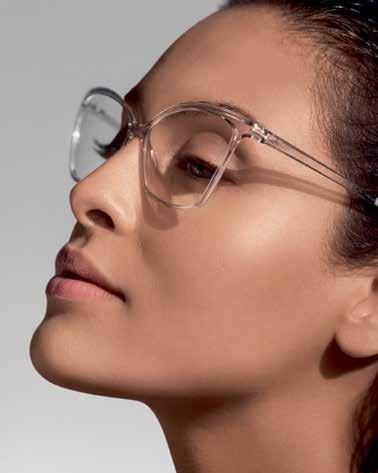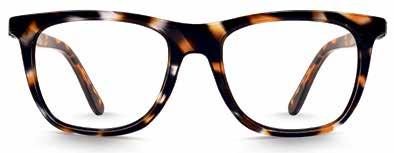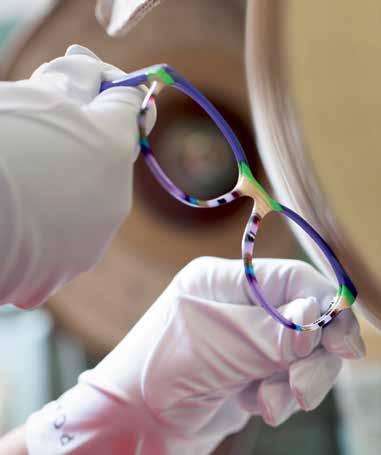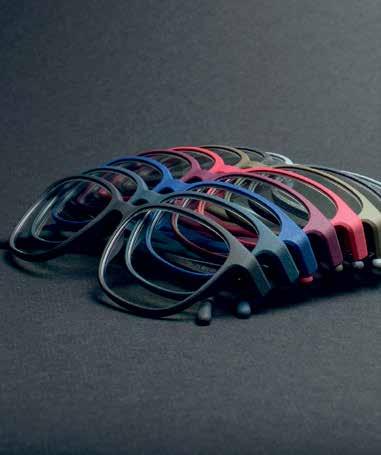
10 minute read
Austria beautifies the eyes of the world
by medianet
The Austrian eyewear manufacturers withstood the challenges of the Covid pandemic and keep a positive outlook.
j by Britta Biron
Advertisement
There are types of products that you associate immediately with certain countries. These connections only apply to a certain extent in our increasingly globalised world, yet historic facts remain and can be still felt today: cars from Germany, watches from Switzerland, fashion and perfume from France, leather goods from Italy. And Austria? There are glasses, particularly in the premium sector.
Fashionable pioneering work
Silhouette laid the foundations for Austria’s international reputation as a manufacturer of elegant premium glasses. “The company was founded in 1964 and had one goal in mind: To make eyewear more than just corrective lenses – to turn them into an accessory with the highest standards in technology and design,” says Michael Schmied, CMO and grandson of the company’s founders Arnold and Anneliese Schmied. “Back then, this was a revolutionary approach and we were pretty much the only ones with this attitude on the market. Thanks to our innovations, Silhouette has often been regarded as a pioneer and innovator for premium eyewear over the last six decades.”
From 1973 onwards, when Austria had already been established as a premium eyewear maker in several countries, Austrian designer Robert La Roche showed spectacle wearers all around the world new highlights with his very first collection. Today, the brand is part of the Graz-based Michael Pachleitner Group, along with nine others such as Daniel Hechter, Spect Eyewear, Kiotonakamura and H.I.S. Eyewear). Since then, more Austrian eyewear makers have entered both the Austrian and international markets such as Pomberger Goisern (1984), Gloryfy Unbreakable (2004), Andy Wolf (2006), Rolf Spectacles (2009) and the two Silhouette subsidiaries Neubau Eyewear (2016) and Evil Eye (2019).
When it comes to sizes, design, production and sales strategies, there are sometimes huge differences but also some common ground – the most obvious being innovative capacity and high flexibility. Combined with their focus on the premium segment and highly identifiable branding, these companies managed to overcome the Covid pandemic.
Iconic brands
“When it comes to frames, we actually missed our targets, but the sales of lenses went according to plan in 2020,” says Michael Pachleitner. It helped that the group had developed spectacle lenses with a special blue light filter several years ago – they saw an increase in demand due to more people working from home, playing computer games or watching online streams. Despite the difficult market conditions, the company still launched several new models even though some of the collections have become smaller. But the pandemic did not change the overall expansion strategy. “We aim for organic growth across all areas, markets and brands – more than 20 percent per year across the entire group. Simultaneously, we are growing through acquisitions.”
© Robert La Roche Robert La Roche has been making extravagant glasses since 1973.


Styrian independent label Andy Wolf celebrates its 15-year-anniversary.
The company is currently focusing on expanding its core markets in Austria, Germany and Switzerland, the United States, France, England and Central Europe – the company from Graz is operating in 60 countries and has an export ratio of 70 percent. Pachleitner is also adhering to his plan to erect an additional production site for lenses in Germany, earmarking twelve to fifteen million euros for the project. He is sure that the investment will pay off: “Buying behavior shows that people are willing to spend more money for premium glasses including lenses.”
Different designs and lots of innovation
Expanding the production site in Linz in 2017 by a lens manufacturing department has paid off for Silhouette. “In times of crises, the advantages of keeping your core competencies close to your chest and your production on location become apparent. The effects of the pandemic were quite different in our sales markets: In some countries, opticians remained open throughout, in others, they were partially closed. Even though the economic effects of the pandemic will be felt for some time we still have ambitious goals and strive for growth,” Schmied says.
He is particularly happy that the young sports performance brand Evil Eye has succeeded expectations. This goes to show that Silhouette’s decision to split from licence partner Adidas and make their own sports glasses was the right one. About 2,000 specialist stores in Austria, Germany, Italy, Spain, Slovenia, the Czech Republic, Switzerland and the Benelux countries are already carrying Evil Eye. Schmied wants to enter further markets step by step; this year, he is focusing on Japan and Great Britain.
Like many other businesses, Silhouette has stepped up several digitisation projects during the pandemic. The Silhouette online store in Austria and Germany saw the addition of a click & collect service as well as a virtual try-on feature. “The feedback is excellent,” Schmied says. “We are going to start offering this service in other markets and also add it to the Evil Eye online store.”
The company also launched a digital showroom in order to tell their retail partners all around the world about new campaigns, products and services in spite of cancelled trade fairs. After all, the main brand Silhouette is exported to more than 100 countries and the export ratio is at 95 percent. Another plan for
© Silhouette
Silhouette turned glasses into a fashion accessory.
the near future is to launch the Evil Eye online store in more and more countries as it is currently only available to clients in Austria and Germany.
On firm ground – online and offline
Business is going well despite the pandemic for independent brand Andy Wolf, which has its 15th anniversary in 2021. The company missed its target of increasing turnover by 20 percent in 2020 but at least did not see a decrease. And this was without any income from e-commerce.
“It’s not easy to find the right glasses online. Often only a few millimetres decide the perfect fit – be it the width of the frame, the depth of the lens or the position of the nose bridge. Glasses are a complex item that you can only fully appreciate when you hold it in your hands and, more importantly, have it on your nose,” explains co-founder and CEO Andy Pirkheim, when asked why the company only uses physical sales channels such as opticians and fashion stores. The distribution network currently includes 2,500 partners in 69 countries which are serviced by fully employed and independent sales agents, wholesalers and a subsidiary in New York for the United States. During the pandemic, the company set up a digital portal for its retailers. “That way we can stay in touch better with our clients and partners, and we could lift our service to a whole new level,” Pirkheim says.
In order to achieve an annual 20 percent increase in turnover this year and also in the years to come, Andy Wolf is focusing on expanding its core markets Austria, Germany, Switzerland, the Netherlands, France, Italy, Russia, the United States and Canada. The aim is to optimise its logistics to ship orders on the same day. An important driver of success is of course the glasses’ design. The focus is on timeless and chic frames even though there are always some statement models – with a few particular ones for this year’s anniversary. There are also a few projects in the pipeline when it comes to increased sustainability. “We have just started a project with the University of Applied Sciences FH Joanneum to develop a sustainable glasses case and a polybag. We are also continuously substituting our acetate with eco-acetate,” Pirkheim says.
Highly resistant
Tyrolean eyewear manufacturer Gloryfy Unbreakable is the inventor and world’s only producer of unbreakable glasses thanks to the patented high-tech plastics NBFX. The company managed to actually increase its turnover in the last year and to continue its path for growth. “2020 and early 2021 were very challenging, of course,” says founder and managing director Christoph Egger. “Sports and eyewear retail is very important to us and the closure of shops has directly affected us. Still, we are looking forward with a lot of optimism.” The glasses’ unique characteristics are a major driver of success, of course. Egger is not afraid, however, that a competitor will make life harder for the company: “There are attempts to copy us from time to time, but our production processes are that complex that it’s pretty much impossible to do so.”
The company is currently expanding its sales network in Germany and the Netherlands. The latest new development has been a tool to try on glasses online; a service that is so far available in Austria, Germany and the Benelux countries. Egger believes that smart technologies will gain importance in addition to great design. The model Gi31 Amsterdam KTM Connect, which was launched this year, has a smartphone interface. Gloryfy has also undertaken its first stets in the new field of blockchain technology. Together with the Viennese design studio Formlos, the company created three sets consisting each of a pair of sunglasses and a non-fungible token as a work of art; they were auctioned off for the charity Weißer Ring.

Successful niche player
Pomberger Goisern also managed to increase its turnover in 2020. The company had purchased more raw material than normal at the start of the pandemic and filled its storages to the brim with finished eyewear. When demand increased in the second half of the year, Pomberger Goisern was fully prepared: “The investment risk paid off. Thanks to our strong sales team we didn’t depend on trade fairs but could show our glasses to our clients on location,” says Hans Peter Pomberger, which took over the company from his father and now heads it together with
Unbreakable glasses are an Austrian invention.
© gloryfy unbreakable

Rolf Spectacles uses eco-plastics for its Substance Collection.
his son Jürgen. “Many people wanted to escape the bleak reality of the pandemic, which resulted in a higher demand for colourful frames.” And there is hardly an eyewear brand anywhere in the world that offers more colours than the in-house brand Johann von Goisern – a brand that has been the family business’ sole focus since 2010. The company developed its own highly complex layering technique which allows for an unusually high number of different colours, patterns and looks.
Pomberger Goisern focuses on expansion like all of its Austrian competitors. Production numbers are going up and the company is expanding its presence in export markets such as the United States, Portugal and Canada. Pomberger is not concerned by the market power of big players such as Luxottica and Safilo: “The larger these corporations get the more niches they leave to small businesses like ours.”
Focus on sustainability
Rolf Spectacles from Tyrol also show that success is not a matter of size. In the beginning, the company’s hinge-less frames from premium woods were making waves, later it added frames from stone, titanium and horn. Numerous models won renowned prizes such as the Red Dot Award, the Good Design Award of the Slimo d’Or, the Oscar of the eyewear industry, so to speak. The new Substance Collection from innovative plant-based eco-plastics is the company’s latest brainchild. It has already won five awards since its launch in spring 2020, the latest being the European Green Award in Gold from the European Institute of Applied Sustainability. Sales partners and retail customers also like the chic eco-glasses and the year of the pandemic was an economic success for Rolf Spectacles, which makes the company optimistic for the future: “We are expecting growth but how big we will grow will depend on a number of factors,” says CEO Bernhard Wolf. “We want to take good care of our collections and grow with our existing customers in the luxury segment. And the new Substance Collection will open up new markets for us.” Wolf sees a lot of potential in Asia but the course is also set on expansion in the United States, Canada and the United Arab Emirates. “The world of eyewear is very exciting. Numerous small and innovative labels invigorate the market and show that glasses are not only becoming more popular, they are also becoming a popular fashion accessory. Glasses are not simply corrective lenses but a way to underline your character or to even change it.” ◆

© Johann von Goisern
Johann von Goisern focuses on colourful models.










